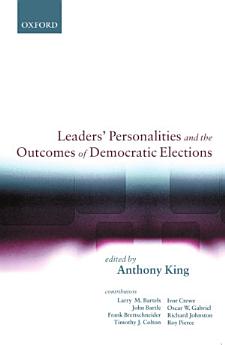Leaders' Personalities and the Outcomes of Democratic Elections
Anthony King
Mar 2002 · OUP Oxford
Ebook
244
Pages
family_home
Eligible
info
reportRatings and reviews aren’t verified Learn More
About this ebook
The conventional wisdom purveyed by the press and television and accepted as true by most politicians is that elections throughout the democratic world are personal clashes between individual presidential candidates and party leaders. Almost everyone assumes that election outcomes are frequently determined by the major candidates' personal characteristics. In the United States, Al Gore in 2000 came over as aloof and arrogantand failed to win his expected victory. In Great Britain, Tony Blair in 2001 came across as dynamic and personableand won a second term. So personal charisma appears to yield electoral success. This study by eminent scholars on both sides of the Atlantic suggests that the conventional wisdom is wrong. Survey research conducted in recent decades indicates that relatively few voters are swayed by candidates1 personal characteristics. Far more important are voters' longstanding party loyalties, their views on issues, and their judgments of how well or badly presidents and parties have performedor will performin office. The votes of even the few electors who are swayed by candidates' personalities usually cancel each other out. As a result, election outcomes are seldom decided by individual candidates' personal images. Occasionally, but not often. Ronald Reagan and Bill Clinton owed their election victories more to economics than to charm. At the end of World War II, the charismatic Winston Churchill lost the 1945 British general election; the colorless Clement Attlee won. Chancellor Helmut Kohl remained in power in Germany for a generation-but was never personally popular. Russian voters reckoned that Boris Yeltsin could not hold his drink- but nevertheless elected him. The implications of the authors' analyses are profound. They suggest that modern democratic politics is not nearly as candidate-centered and personality-oriented as is often supposed. They also suggest that parties' policies and their performance in office usually count for far more than the men and women they choose as their leaders. Not least, the authors suggest that the efforts of political consultants, advertising agencies, and spin doctors are often misdirected.
Rate this ebook
Tell us what you think.
Reading information
Smartphones and tablets
Install the Google Play Books app for Android and iPad/iPhone. It syncs automatically with your account and allows you to read online or offline wherever you are.
Laptops and computers
You can listen to audiobooks purchased on Google Play using your computer's web browser.
eReaders and other devices
To read on e-ink devices like Kobo eReaders, you'll need to download a file and transfer it to your device. Follow the detailed Help Center instructions to transfer the files to supported eReaders.






